Peter MALONE
Saturday, 18 September 2021 19:57
Mission Impossible: Rogue Nation
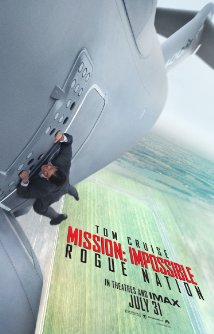
MISSION IMPOSSIBLE: ROGUE NATION
US, 2015, 131 minutes, Colour.
Tom Cruise, Rebecca Ferguson, Simon Pegg, Jeremy Renner, Alec Baldwin, Ving Rhames, Sean Harris, Simon Mc Burney.
Directed by Christopher Mc Quarrie.
‘Romp’ might not be the word expected to head a review of the newest Mission Impossible venture. But, that is what it is, an action-adventure-romp.
The tone is immediately clear in the prologue, a plane taking off in Minsk, Belarus, with Benji (Simon Pegg) lifting his camouflaged head from an open field, communicating with William at the IMF, Impossible Mission Force, headquarters in Washington DC as well as with Luther (Ving Rhames) in Thailand, worried about the deadly cargo in the plane hold, wondering where Ethan Hunt could be – when suddenly he emerges, races towards the plane, grabs on to a door handle, Benji making all kinds of mistakes in trying to open the door electronically, even the wrong door, with Hunt hanging on as the plane takes off, the door finally open, and his being projected into the plane, confronting the armed guards – and then pushing the cargo out backwards and parachuting down… That’s Tom Cruise for you.
And then we have the credits! And, of course, the immediately recognisable theme music by Lalo Schifrin.
Someone remarked afterwards about the realism or lack of realism in the film! Realism is one of the last things to be expected from this action-packed series. After all, the title is Impossible, and that is the point. Ethan and his colleagues spend over two hours doing the impossible in the face of extraordinary dangers, need for extraordinary stunts (which Tom Cruise and Rebecca Ferguson mainly do themselves), split-second timing, everyone in peril at some stage, athletic feats of endurance – and winning at the end. If that is not what we were expecting, then better to give it a miss for something more ‘realistic’.
As the subtitle suggests, there is a sinister organisation, called The Syndicate, operating around the world very secretly – even Alec Baldwin, the rather dyspeptic head of the CIA, does not believe that it exists, thinks it is a ploy by the IMF and is not impressed by Ethan Hunt who seems an outsider, avoiding accountability. But, Ethan has been pursuing The Syndicate, but is suddenly caught by the ex-British military head, played by Sean Harris. Will he escape being tortured? No, not escaping the torture, plenty of that, but eventually escaping the cell and going underground until he has a firm lead to find the villain.
By this stage, the action has been in Belarus, and in a rather detailed central London, then in Havana, hiding in Paris, which leads Ethan and Benji to Vienna.
For those who enjoy travelogue aspects of these thrillers, there is plenty to see in Vienna, especially at the Opera House (interiors, stage, and action on the roof) and, as a distraction from an assassination attempt on the Austrian head of state, a performance of Puccini’s Turandot. And then we are off to Morocco, to Casablanca seen in a great deal of detail, out into the deserts of Morocco and into the mountains. It all climaxes in London, focusing on the British Prime Minister, again with a great deal of touristic detail, though that is much more familiar.
A new ambiguous woman is introduced in the form of Rebecca Ferguson, attractive, athletic, lethal in some of her fights, with the audience hoping that despite appearances she really is a goodie. Simon Pegg is back as the technical whiz, involved in a lot of the action as well as the comic aspects. And Jeremy Renner is also back, the liaison with the CIA, as well as Ving Rhames as Luther, no mean activist with technology as well.
If you want ‘romp-action’, and an entertaining night out, plenty of adventure, quite a few twists, often a tongue-in-cheek turn, with quite some stunts, then this episode of Mission Impossible, written and directed by Christopher Mc Quarrie, best known for The Usual Suspects, but clearly a friend of Tom Cruise, writing screenplays for him for Valkyrie, Jack Reacher, Edge of Tomorrow, will fit the bill.
1. The series running for almost 20 years? The fifth instalment?
2. The origins in television, the inspiration, development of the basics of the program, characters, situations? The use of the background musical theme?
3. Tom Cruise as Ethan Hunt, the Impossible Mission Force?
4. Each film as topical, reflecting each decade, especially the United States? International developments?
5. The use of technology, developments?
6. Action, stunts, editing and pace? Tom Cruise and his own stunts?
7. The prologue, relevance, the tone, Benji literally in the field, the cargo on the plane, the contact with William in the US, with Luther in Thailand? Ethan appearing, chasing the plane, hanging on, the doors finally opening, projected into the cargo hold, the guards, exiting out the back?
8. The US, Washington, the CIA, the official and his jealousy, the hearing, William and his not being able to comment, the move for the abolition of the IMF?
9. Benji, the computer games, the polygraph test, his work, the opera tickets and his going to Vienna?
10. Ethan, allegedly in Cuba, the hit squad, his not being there, meanwhile in Paris?
11. In London, going to the shop, the encounter with the assistant, Ethan being taken, the torture, Ilsa and her presence, the key, helping him escape? Lane and his presence?
12. The role of Ilsa, helping Ethan, British, deep cover, in London, in Vienna, the set up, the shooting the Austrian leader, shooting at Benji, the tests for her loyalty to Lane, helping Ethan, on the roof, down the building, the car and escape?
13. The action in Vienna, the opera, the staging of Turandot., the singing? The attempted assassination? Ethan in the rafters, the attack on the shooters? Benji, his presence, the subway, the contact with Ethan, the visual contact, his controlling the props?
14. The transition to Morocco, the views, Casablanca, the mountains, the desert, the car chases, down steps, along highways, cars, motorbikes?
15. The extensive plant, the water, underground? The information stored? The role of the British Prime Minister, able to decipher, with words from Kipling? Lane and his assassins? Benji, the information, security, split-second timing for Ethan to substitute the new profile, Benji getting through security, getting the memory stick? Ilsa controlling the water, Ethan holding his breath, the tensions, the escape? Ilsa and her stealing the memory stick? Bill and Luther, their presence in Morocco, the chases?
16. Ilsa in London, meeting with Atlee, his being her control, the truth about the Syndicate, ex-British military? His deleting the contents of the stick?
17. Lane, his character, relentless? The setup for Ethan to meet him? The auction, Ilsa present, the Prime Minister, Atlee, the confrontation, the CIA official,
his being gobsmacked by the reality of The Syndicate? The unmasking – and Ethan in control?
18. The final set up, Lane, his presence, near the Tower of London, Ilsa at the table, the pursuit, the streets, the dangers, pursuits? Ilsa and her fights with the torturer, the knife? The ultimate trapping of Lane, the glass cage, in the van?
19. The characters of Benji, William, Luther, their particular expertise and use? Loyalties to Ethan?
20. The Senate committee meeting, William and the cover for the head of the CIA, reinstalling the IMF?
21. An entertaining action romp?
Published in Movie Reviews
Published in
Movie Reviews
Tagged under
Saturday, 18 September 2021 19:57
5ive Girls
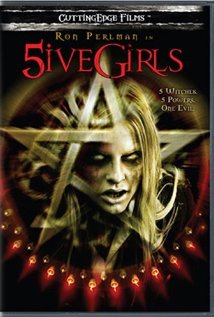
5IVE GIRLS
US, 2006, 95 minutes, Colour.
Ron Perlman, Jennifer Miller, Jordan Madley, Amy Lalonde.
Directed by Warren P. Sonoda.
5ive Girls is a small-budget piece of schlock-horror with some sexual overtones.
St Marks is a school for girls, a huge building but having only five girls as students, with a very strict principal and a teacher from the previous life of the school, Father Drake, played by Ron Perlman, an alcoholic priest with a propensity for inappropriate touching.
There are mysterious rooms in the building, and soon there are evil influences at work. The reference is to the Bible with a focus on the devils, Legion. However, for the melodrama, the evil forces move from character to character, one at a time, rather than a whole scale invasion.
This leads to some diabolical horror, various girls being affected, Father Drake unable to save them, himself becoming a victim. And there are clashes with the strict principal.
Things finally come to a head with the legion of Demons deciding to launch a wholescale attack on the girls.
The actresses playing the girls, older than schoolgirls, are of the nubile variety and filmed accordingly!
For afficianodoe of this kind of straight-to-DVD horror.
Published in Movie Reviews
Published in
Movie Reviews
Tagged under
Saturday, 18 September 2021 19:56
Cass Timberlane
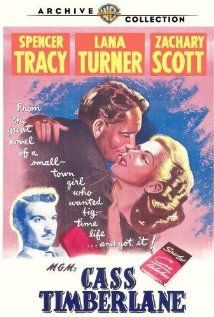
CASS TIMBERLANE
US, 1947, 119 minutes, black and white.Black and white.
Spencer Tracy, Turner, Zachary Scott, Tom Drake, Mary Astor, Albert Dekker, Margaret Lindsay, John Litel, Mona Barrie, Josephine Hutchinson, Selena Royle.
Directed by George Sidney.
Cass Timberlane is based on a novel by Sinclair Lewis, author of other novels like Main Street. While the film was written earlier, it has been adapted to draw a picture of American society in middle America immediately after World War II.
Spencer Tracy is very much at home in the role of the judge, Cass Timberlane, presiding over cases, enjoying his job, yet often bored. He belongs to the Country Club with affluent and arrogant members, especially the gossiping women led by Mary Astor. The men have been involved in business during the war, some of their deals particularly shady, their expecting Cass to shield them.
When Cass comes across a young woman, Virginia, played with charm by Lana Turner, he is comfortable with her and eventually marries her. She has to adapt to the Country Club behaviour and suffer the expectations of the women. When their child dies in childbirth, she finds the situation very hard, wants to move out.
This is complicated by the presence of Cass’s friend and suave lawyer, Zachary Scott.
The situation comes to a head, the possibility of a divorce – even though there is an initial speech by Cass in the courtroom against divorce. There is a rather melodramatic solution to the problems, but the film is an enjoyable picture and critique of American society at the time, directed by George Sidney who was to go on to make many musicals at MGM.
1. The novels of Sinclair Lewis? His place in American literature? Perspectives on American towns?
2. MGM production, the 1940s, black and white photography, locations, the cast?
3. Minnesota, the town, the court, mansions, the poorer quarters, the Country Club, New York glittering life? The musical score?
4. The title, the character of Cass Timberlane, Spencer Tracy in the role? Age, deceased wife, judge, his house, servant, the hearings, procedures, his boredom, Bradd and his role as a lawyer? His speech about divorce, sacredness of marriage, refusing the divorce? The wealthy set, the dinners, the Country Club? The sketch, meeting Ginny, discussions, his going for the walk, the baseball umpiring, the spaghetti meal, his taking time out? His relationship with Chris, expectations, especially from the women at the Club? Comfortable with Ginny, the proposal, marriage? The happy life, the requirements of Ginny to go to the club, buying the dress? Her pregnancy, the death of the child, grief? At home, playing chess? His reaction to Ginny with Bradd? Her response, saying she was stifled, wanting to leave, not at home with the wealthy set? Cass and his decision to go to New York, hopes, Ginny going shopping and to society with Brad? The possible job, Cass looking at his conscience, turning it down, returning home? His friends and their expecting him to delay the case, his refusal? The discussions with Jamie, the truth? Hearing of the accident, hurrying to Ginny? Her return home?
5. Ginny, Lana Turner and her presence, her life, boarding, her work, witnessing in the case, the sketch, the encounter with the judge and with Bradd? The baseball, the spaghetti meal, sharing so much with Cass, the easy talk, the outings, marriage? The new dress, going to the Club, her reaction, People’s reaction, polite but looking down on her? The pregnancy, its effect, her grief at the death of the child? At home, the chess game, with Bradd, feeling stifled, the criticisms of the women? Bradd going to New York, Cass and his decision, their flying to the city, her enjoying the shopping, society, Bradd’s contacts? Realising that he was working for the company at home? Getting out of the car, the accident, Cass coming to see her, her surviving? The importance of her conversation with Lillian and discovering Lilian’s unhappy 25 years of marriage?
6. Bradd, suave, as a lawyer, in society, flirtatious? Friendship with Cass? The company and their hold over him? With Ginny? Going to New York, meeting her there, shopping, society, the restaurant, the company’s hold over him, her getting out of the car?
7. The town society, the Country Club, the snobbery of the women, the gossip, their expectations, Lilian and her unhappy marriage, humiliated? Talking with Ginny?
8. The men, the walk, the deals, the company, aftermath, the law, postponing their trial in the courts, thinking Cass was on their side, disillusionment? The doctor and his humiliating his wife?
9. Jamie, the war, hero, drinking, wanting a divorce, lectured by the judge, upset, telling the truth?
10. Chris, possibility as a wife for Cass, his liking her, belong to the club, more genteel?
11. The picture of the United States immediately after World War II, the picture of affluent society?
Published in Movie Reviews
Published in
Movie Reviews
Tagged under
Saturday, 18 September 2021 19:56
Paper Towns

PAPER TOWNS
US, 2015, 109 minutes, Colour.
Nat Wolff, Cara Delevingne, Austin Abrams, Justice Smith, Halston Sage, Jaz Sinclair, Cara Buono.
Directed by Jake Schreier.
This will not be an easy film for adults to sit through. It is very much a niche film, targeting teenagers, possibly some older young adults, but very much the audience which could identify with the central characters, in their last months at high school.
The film is based on a novel by John Green, novelist for young adults, who had great success with the film adaptation of his The Fault in our Stars. This one is even more teen-focused.
The setting is Florida and the central character, Quentin (Nat Wolff who has done this kind of role in Palo Alto and Behaving Badly), Q to his friends, provides voice-over, telling us about himself and his lifelong devotion to, infatuation with, eventually love for, his neighbour Margo (British model, Carla Delevingne). She is a strong-minded little girl, easily able to exercise her influence over Q and his willing submission to her.
The first part of the film shows Margo in mean-minded form, now having moved away from Q, infatuated with one of the jocks at school, relying on the popular kids for her friendship. Then she thinks they have betrayed her. On a whim, she summons Q to help her get some vengeance, ringing up the parents of her girlfriend who is having sex with her former boyfriend and watching the confusion, lifting the eyebrow from another associate while he sleeps… Q is completely manipulated by Margo and her whims but finds the whole experience exhilarating.
Q also has two friends from school, who hang out together, discuss everything, Ben and Radar.
When Margo disappears from her disapproving parents, Q decides he knows where she has gone because, after the whims, they have gone to a tall building and looked out over the city with Margo talking about paper towns, towns that exist but with no one in them. And she will make the analogy with paper people and herself.
The rest of the film is a road trip, Q taking his mother’s car, following Margo’s clues to New York State, Ben and Radar coming along as well as their girlfriends. There are a couple of adventures on the road, skidding after almost hitting a cow, Radar and his girlfriend having a sexual encounter to the eager curiosity of the others.
So, will Q find Margo? Had she gone to a paper town? If he finds her, what will he say about his love for her? And what about the Prom that the other friends want to go to but in which Q shows no interest?
Teen audiences may well want to see how these questions are answered – parents and adults may prefer to ask the teens afterwards what happened.
1. The title, the explanations, the towns, the maps, paper people?
2. A young adult story, the work of the author? For a teen audience? High schoolers? Coming-of-age film?
3. The Florida settings, the towns, homes, streets, the school, dances, the youngsters hanging out? On the road, New York State, the barn, the small town? A piece of Americana?
4. The characters and their perspectives, the final year at high school? The attitudes of their parents – not appearing much during the film, Margot’s parents critical, Quentin’s mother supportive? A general absence of adults from the story?
5. The focus, the teens, their world, finishing school, a somewhat enclosed life, touches of rebellion and dependence, relationships, love, sexuality? Attitudes to parents?
6. Quentin, his age, voice tone, the voice-over? His memories, confiding the stories about Margo, their being together as children, sharing, Margo and her strength, Quentin as a follower? The visualising of the memories? The changes as they grew up, drifting away from each other? Margo and interest in other boys? Quentin, relying on his friends, deceiving himself about his feelings for Margo?
7. Margo, coming to Quentin at night, the invitation to go out, her whims, her jealousies, getting petty vengeance on her friends because of their betrayal? Quentin and his reluctance? Margo manipulating him? Taking his mother’s car? The vengeance – the phone call to the girl’s parents indicating she was having sex in the basement, the boy leaping at the window naked, running away, his car being trashed? Going to the house the friend, taking his eyebrow off? His anger? Going to the building and the guard letting them in? Looking over the city and the lights? Talking of paper towns? The return home, the effect on Margo, the effect on Quentin, being daring?
8. Margo, discussions with her parents, her disappearing? Always leaving clues? Quentin and his response, his mother’s response?
9. Quentin and his friends, the characters, talking, Ben and the comic touches, Radar, his girlfriend? The prominence of the Prom, Radar wanting to go, Quentin not interested? The interactions between the three?
10. Quentin, his decision to find Margo, the map with the holes, the idea of the paper towns, the research, the decision about the town in New York State? His taking his mother’s car? Inviting his friends to go with him? Ben and his fondness for the girl, her being strong-minded, the promise to go to the Prom, her decision to go? Radar, going to his girlfriend, she thinking he was breaking off, his explanations, her decision to go?
11. Travelling the roads, Radar keeping the time, wanting to return for the Prom, Ben and his needing to go to the toilet, the cans? Going to the store, hurrying, buying everything? The sharing between the friends? The cow on the road, Ben taking the wheel, the skidding? Having to stay the night? Radar and his girlfriend on the rug, talking, sex? Talking about it the next morning? The repair man coming? Quentin phoning home?
12. The arrival of the town, finding the barn, Quentin’s being sure? The empty barn? The others wanting to get back, taking the car? Quentin, getting the lift, arriving in town, buying the bus ticket, seeing Margo? Following her, the puzzle about his presence? Their spending the time together, discussions, Margo trying to sort herself out, no plans? Quentin declaring his love? His going back by bus?
13. The Prom, Quentin changing his mind, dressing up, his mother helping? Going to the dance, the two couples, the dancing, his joining in?
14. The theme of the last months at school, the separation of friends, futures in different places? Quentin reflecting on the sightings of Margo and the different possibilities?
15. Effect of this experience on Quentin and helping him to grow up?
Published in Movie Reviews
Published in
Movie Reviews
Tagged under
Saturday, 18 September 2021 19:56
Pan-Americana
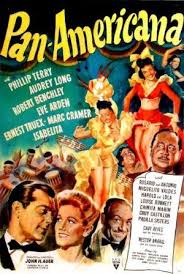
PAN- AMERICANA
US, 1945, 84 minutes, Black and white.
Philip Terry, Audrey Along, Eve Arden, Robert Benchley, Lita Baron, Miguelito Valdes.
Directed by John H. Auer.
There is no major reason for seeing this film – and very few minor reasons. However, it is of some historical interest, reflecting the pan-American attitude during the war, although the film came out just as the war was ending.
The plot is slight. Eve Arden, always worth seeing with her sardonic remarks and screen presence, is the editor of a magazine and wants to have a series on the most beautiful women in the world, specifically in Latin America. She summons the main photographer of the magazine, Philip Terry, who wants a holiday but who is forced to agree to go on the tour. A young woman in the office, played by Audrey Long, insinuates herself into his good books and becomes his assistant. In fact, she only wants to wangle the trip in order to get to Brazil to meet up with her fiance. Nobody will be surprised that by the end, she teams with the photographer and they end up together.
While the film has a tour of Latin American countries, it is still studio-bound touring.
Interspersed with the slight plot, there are various performances, music, dancing and songs, especially from some big names in Latin American show business of the time.
There is also some supporting comedy by Robert Benchley.
(Nothing to do with the film but Philip Terry was Joan Crawford’s fourth husband and Audrey Long married Leslie Charteris, the author of The Saint series!)
Published in Movie Reviews
Published in
Movie Reviews
Tagged under
Saturday, 18 September 2021 19:56
Gett: the Trial of Vivanne Amsalem
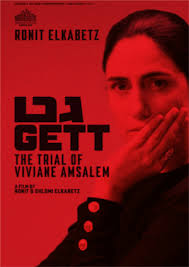
GETT: THE TRIAL OF VIVIANNE AMSALEM
Israel, 2014, 115 minutes, Colour.
Ronit Elkabetz, Simon Abkarian.
Directed by Ronit Elkabets, Shlomi Alkabetz.
This is a very challenging film from Israel, for people in Israel itself as well as Jewish people around the world and all those interested in Jewish traditions or may be puzzled by some of them.
Ronit Elkabetz is a distinguished Israeli actress who is made quite a number of striking Israeli films and has appeared in some French films. She has written and co-directed this film with her husband, and takes the central role.
It is a film about divorce in Israel, Get, and the processes whereby a woman applies to be divorced, to a tribunal of religious leaders, with her defence lawyer, but all the time dependent on the consent of the husband or no divorce is granted. This is a civil-religious situation, drawing on traditions, very much mail-oriented, expecting husband and wife to live out traditional marriage, and often ignoring the experiences of the wife in terms of the dominance, physical or psychological, religious and moral, of the husband.
Perhaps it is necessary to give a warning that audiences will experience the situation of a wife who is trapped by her husband’s non-consent, appearing in court over several years, with gaps of some months where she tries to obey what the tribunal orders her, to live with her husband. The only locations on screen are the courtroom and the anti-room where people wait. It is particularly cut claustrophobic for the audience as they are confined to the limited and small locations.
The couple in question have been married for many decades, the wife, married in her teenage years, subservient to her husband, bearing children and rearing them, but finding her husband’s superior attitudes and his domination so taxing that she feels she needs to get away and for him to grant her a divorce. In the meantime, she has moved from the house to live with her sisters, yet still cooking every day for her husband and children, with herself or her sisters delivering the meals. When the tribunal, despite her pleas, insists that she still fulfils her home duties before they will consider hearing her case again, we are told, rather than seeing, that she complies with the wishes. What we see is the toll that it takes on her.
The husband is a significant character, of course, well played, unsympathetic to the audience, by Simon act barrier. Not only does he refused to grant a divorce but he often refuses even to come to the court. He is commanded to appear, even sentenced to a time in prison for his non-compliance, but one of the most stubborn men one could encounter. Is respectable, a community leader, leader of music in the Temple. He demands that his wife fulfil our obligations.
To help us understand the situation, two of the central characters are the lawyer for Vivianne’s defence, a reputable lawyer whose father had a strong reputation and who argues his case with some emotion. defence lawyer for the husband, is his brother, a shrewd and rather smooth-tongued lawyer, able to take advantage of any looseness in remarks.
Then there are the witnesses over the several years, neighbours who think the husband is respectable, and neighbouring wife who, as her testimony goes on, is clearly under the same often insensitive dominance from her husband. There are people from the choir who can testify that the husband can give people a hostile silent treatment, and for many years. The wife’s two sisters also give testimony, when giving the rabbis the rounds of the court in her vigorous defence of her sister.
And, the tribunal itself is very interesting, a very dominating Rabbi overseeing proceedings, and his two assistance, trying to get into the developments of the trial, as well as the clerk of the court.
Ronit Elkabetz portrays Vivian with great bearing in dignity, holding up under very difficult circumstances, month by month, year by year, living the frustration of her husband’s continued refusal to consent to her divorce.
Anyone in the audience has been involved in an Australian divorce situation will be caught up, moved, and frustrated by their sharing in this is rarely experience.
1. A film from Israel? Religious background? Secular background? Traditions?
2. The title, the issue of divorce, the applications of the law, tradition and customs, the roles of men, women? The rabbis as judges? Prosecuting lawyers and defence? The Israeli settings? The focus on the court room, the anti-room – and the rest of the action off-screen?
3. The title, the focus, the religious background, the focus on Vivianne? Where did audience sympathies lie?
4. Vivianne, the character, age, her life, background, the early marriage, the children, expectations of her as a wife, her expectations of her husband, his status, religious background? Her wanting a divorce, the process taking years, the judges and their listening? The behaviour of Vivianne, her husband, the lawyers, the judges? The talk?
5. The court and the ante-room, confined experience for the protagonists, the audience? The effect of the confined space? Vivianne sitting at the desk, sometimes standing up, in the outer room? Elisha opposite her, sometimes present, sometimes absent, standing in the corner? The presence of the lawyers, the judges, the witnesses, the clerk?
6. The plea for divorce, the request by the woman, consent or not by the man? The marriage situation, 20 years, incompatibility, the attempt to do the right thing? Vivianne wanting to leave, going to live with her sisters, cooking the meals, their being carried to the husband and children? Hurt and feelings of oppression? Wanting freedom?
7. The three years of the process, the captions indicating the passing of time? The audience not seeing what happened off screen, the explanation, Vivianne’s obedience, growing desperation?
8. Elisha, character, age, righteous, refusing the divorce, not coming to the court? His life, the long marriage, his children? Sexual duties on not? Absent from the court, present? His hard stances? His being sentenced to jail and serving the term?
9. The defence lawyer, the reputation of his father, his skill in the court, his appeal to the judges, his speeches, accused of love for Vivianne, his interrogations, producing evidence? The clashes with Shimon?
10. Shimon, smiling and ironic, Elisha’s brother, his stances, his interrogations, his playing the legal games?
11. The judges, the head, severity, wanting order, the two assistants, their interventions? The role of the clerk, things in order?
12. The range of witnesses? Revelations about Vivianne and Elisha, their marriage? Some sympathetic? Others respecting Elisha? The witnesses and the questions probing their own lives, their own marriages, the dominance of the men? The unmarried sister, the testimony? The contrast with the married sister and her assertiveness and verve? The neighbours, their testimony, the man, the interrogation of his wife and his continually intervening, the revelations about his dominance?
13. How much of Vivianne’s character as revealed through the testimony? Of Elisha’s?
14. The testimony about Elisha, his righteousness, at the Temple, the music, his clashes with some of the members, his severity, not speaking to them the years?
15. The judge, interventions, his being absent, the return?
16. The deal, Elisha and his refusing, the effect, the dismissal of the case, waiting, the final decision and his axes into the divorce? The repercussions for
Vivian?
17. Insights into Israel, the status of men and women, marriage and family, the status of religious leadership? Decisions about divorce?
Published in Movie Reviews
Published in
Movie Reviews
Tagged under
Saturday, 18 September 2021 19:56
Black Nativity

BLACK NATIVITY
US, 2013, 92 minutes, Colour.
Forrest Whitaker, Angela Bassett, Jennifer Hudson, Tyrese Gibson, Jacob Lattimore, Mary J.Blige, Vondie Curtis- Hall, Grace Gibson.
Directed by Kasi Lemmons.
Black Nativity is geared towards a niche audience, African- American audiences, especially those who are at home in Christian churches, revival meetings, enthusiastic prayer in the spirit as well as a belief in the goodness of human nature and hope in human miracles. For others who share this spirit, the film will be inspirational. Otherwise, it might be too much to take with its explicit religious enthusing as, preaching, drawing on the Christmas story and applying it to contemporary problems.
The film has a libretto by African- American poet, Langston Hughes. And writer-director, Kasi Lemmons, has woven a moralising story around this so that it is drama and melodrama, especially towards the end, along with the many songs, some in the Negro Spiritual tradition, others more in the rap tradition, and some presented in operatic style. The musical atmosphere of the film will be an invitation to some to enjoy it but may prove difficult for those not on the wavelength.
The contemporary story involves a teenager, played by rap-singer, Jacob Lattimore, who lives with his single mother, Jennifer Hudson, who is about to lose her house. She is alienated from her parents but decides to send her son to stay with them. He travels from Baltimore to New York, his luggage is immediately stolen by a young boy, and when he tries to get information, he sees a wallett left on the hotel counter. In prison, he comes across a tough man whom he later meets at a pawnbrokers, also selling guns, who turns out to be his absent father.
He is bailed by his grandfather, a minister at the church, and welcomed to his home, especially by his wife. The couple are played by Forrest Whitaker and Angela Bassett. The minister shows the boy a watch given to his father by Martin Luther King, which the boy takes and attempts to pawn, only to be rebuffed in the shop by the owner, played by Vondie Curtis Hall (husband of director Kasi Lemmons).
Along the way he meets several characters in the street, a white-wigged singer, Mary J.Blige, who performs as an angel in the church and a genial couple who have been saved by the Minister.
The boy is resentful, tries to contact his mother, is compelled to go to Black Nativity, a religious performance at the church, compered by the minister, with his wife in the chorus, lots of singing, clapping and shouting, with the minister telling the story of Mary and Joseph going to Bethlehem, a couple coming through the church to re-enact this.
The boy falls asleep, experiences a fantasy sequence in Times Square, experiencing the equivalent of Mary and Joseph coming to Bethlehem, Mary in need, his trying to help, the birth of the child. But, when he wakes, he leaves the church to keep an appointment with the gun dealer – who challenges him about why he wants the gun, reveals the fact that he is his father, supplies something of the background reasons for his leaving. In the meantime, the minister’s wife urges a young policeman to go to find the boy.
At this time, the mother travels to New York City, arrived just in time to see the police with her son and the father of her son. The boy is upset, realises this is an opportunity to find out the truth about himself and his life, what he has always been yearning for – and the group go into the church, with the minister being compelled to explain what he had done, paying off the man, suffering the loss of his daughter, but his daughter able to forgive him, embracing her mother, and a reconciliation all-round.
The final scenes offer an opportunity for all the characters to sing, especially Jennifer Hudson (Oscar for Dreamgirls) as the mother.
The film is very edifying and inspirational – probably too much for a more secular-oriented audience. But it is interesting to see the gospel stories presented in dramatic and song form, and an unashamed reliance on the biblical messages for the contemporary world and troubles.
Published in Movie Reviews
Published in
Movie Reviews
Tagged under
Saturday, 18 September 2021 19:56
Wings of the Navy
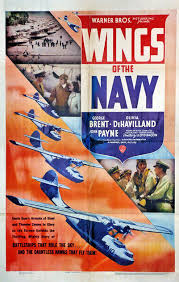
WINGS OF THE NAVY
US, 1939, 89 minutes, Black and white.
George Brent, Olivia de Havilland, John Payne, Frank Mc Hugh, John Litel, Victor Jory, Henry O' Neill.
Directed by Lloyd Bacon.
At the end of the 1930s, on the eve of war in Europe, and in 1940, 1941, on the eve of Pearl Harbor, the American studios made a number of films about military developments, the Navy and, especially, the air force – Dive Bomber, Captains of the Clouds…
This film is earlier but is in this vein, a look at developments in the structuring capacity of planes, pilots testing the planes, and the enthusiasm of those joining the air force. To that extent, it is a propaganda piece.
The material is familiar and the film not so interesting to watch except as an example of filmmaking at the time, the issue of planes and warfare, and the cast and their careers.
George Brent, even more stolid than usual, is the older brother of John Payne. At the opening, a memorial to their inventor father is unveiled, with very patriotic sentiments. He was an air force man and George Brent plays an inventor and pilot. John Payne is in submarines but wants to join the air force – always competitive with his brother.
The film spends a lot of time in showing the recruits going to Pensacola, Florida, to train, some eliminated because of heart murmurs, others, like Frank Mc Hugh, commercial cropduster who signs up. He provides a lot of the comedy, clashing with authorities, putting his foot in it, but eventually succeeding.
George Brent, very serious minded, continues his plane designs but is involved in an accident. John Payne, brash at times, continues his training in the air force and, of course, despite hesitations, volunteers to go up in the testing of the plane, suffering from height blackouts but ultimately succeeding.
The other complication is Olivia the Havilland. George Brent is in love with her and she with him. However, as he has to be absent from Florida, he entrusts her to his brother, even though he realises that his brother is in love with her. She has to face the dilemma of love and the realities of loyalty. This is a rather upright film and she stays with George Brent.
Direction is by Lloyd Bacon, a regular of so many genre films of Warner Brothers at this time.
Published in Movie Reviews
Published in
Movie Reviews
Tagged under
Saturday, 18 September 2021 19:56
November Man
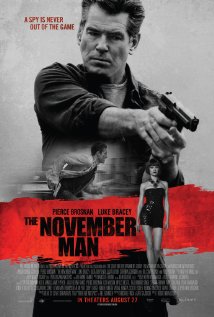
NOVEMBER MAN
UK/US, 2014, 108 minutes, Colour.
Pierce Brosnan, Luke Bracey, Olga Kurylenko, Bill Smitrovich, Lazar Ristovski, Mediha Musliovich, Eliza Taylor, Will Patton.
Directed by Roger Donaldson.
November Man is based on a novel by Bill Granger, There are no Spies, one of a series of espionage novels from the Cold War era. It has been updated to the 21st century.
The film is a star vehicle for Pierce Brosnan who is also a producer, an opportunity for him to go back into the world of espionage, with as much ingenuity, or more, as James Bond, but not nearly so suave in manner. Brosnan fits the bill is very well. His associate is played by Luke Bracey, Australian actor from Home and Away, his former pupil, not obeying orders, resentful, but ultimately admiring Brosnan.
The settings are attractively photographed, in the Balkans, in Moscow, in Serbia and Belgrade.
The world is rather ugly, assassination attempts in the Balkans, CIA surveillance in Belgrade headquarters, pimps from Eastern Europe and the trafficking of girls, conspiracy theories, CIA linking with Russians in Chechnya to do damage causing deaths which would lead to civil war.
The film concerns a Russian candidate for President who has a dubious background (with audiences thinking of Vladimir Putin). There is a witness who can testify against the Russian, and attempts are made to eliminate her, the Russians sending a cold-blooded female killer to Belgrade, the Americans wanting her dead to conceal her evidence.
The cast includes Olga Kurylenko as a mysterious woman, working to save the traffic women but having her own secrets. Bill Mitrovitch has a good role as a CIA agent, friend of Brosnan, but with secrets of his own and a fanatic in ideology. Will Patton is a CIA chief, seemingly sinister.
The film has a great deal of action and is directed by Roger Donaldson, the Australian director who began his career in New Zealand but moved internationally with a wide range of films including The Bounty, Marie, The Bank Job.
1. 21st century espionage – from a novel from the 20th century and the Cold War era?
2. The Balkan settings, Moscow, Serbia and Belgrade? Colourful and authentic? The musical score?
3. Espionage, agents, the CIA, Russians, the background in Chechnya, the Balkans?
4. The background of CIA training, the young recruits, hard training, reports and criticisms? In action?
5. 2008, the politician, the assassination attempt, Peter and his changing clothes, David Mason and his being a sniper, not following orders, the death of the assassin, the death of a child, Peter’s reaction? The setting and preparation for later action?
6. Switzerland, Peter, age, retirement, care for his daughter? The visit from Hanley, the photo and their past friendship? The information, the situation in Russia, the need to withdraw the agent, her request that Peter do it? Her having information, and name, the threat to the Russian presidential candidate? Weinstein and Langley, the interactions with Hanley, his perspective on the withdrawal? The orders to kill the woman? Mason and his associates, the vehicle? Peter making the connection, taking the girl, the relationship, her puzzle, the chase, the shooting of the crash, her death? Mason and the confrontation with Peter, not killing her? The mystery of the CIA action?
7. The Russian assassin, cold-blooded, her contacts, working at the restaurant to kill Alice, the pursuit of Peter, her being outwitted, her death?
8. Weinstein, the connection, the orders, hard stances, the surveillance headquarters, the variety agents, the screens? Hanley and his presence? The friendship with Peter? His being taken, in the room, interrogated, the woman interrogator, his defying her, the fact that he had written the rules?
9. The irony of the twist, Hanley being the villain? The past, friendship, CIA activity, his ideology, wanting the US and Russia to combine, his plans for peace, the conspiracy? Chechnya, the bombing of the building, CIA plan? The Russian candidate and witness? The Americans and the need for his elimination?
10. The information about the mysterious girl, the flashbacks, the death of her parents, her witnessing the bombing, her being taken by the candidate, the years with him, the sexual exploitation, her escape? Serbia, the agency for the traffic women from Chechnya and other countries? Alice, her work at the agency, the photo, identification?
11. Peter and Alice, the connection, at the restaurant, the killer’s attempt on her, the escape, chases through the city, Peter and his techniques for evading pursuit? Taking Alice to the apartment?
12. Mason and Hanley, orders, his partners, going into action, following Peter, Peter shrewd, evading pursuit, the use of the phones, surveillance, tracking, his tricks?
13. Mason and the girl, the neighbour, going out, the sexual relationship, Peter arriving, holding the knife to the girl, and his threats to Mason?
14. The truth about Hanley, the truth about Weinstein, about the Russian, the American conspiracy, about the young woman and her being sought, her being a witness, to be eliminated?
15. The pimp, at the club, Alice and her connections, knowing Peter, the information – and his later death?
16. Alice, in reality the young woman being sought, the dangers? Her getting dressed, provocative, going to the hotel, to the Russian’s room, the sexual encounter, the knife and the confrontation?
17. Peter and his intervention, saving her?
18. And the many deaths, the pimp? The Russian candidate, not a contender, in luxury, killed on his yacht?
19. Hanley, the discussions with Peter, his ideology, death?
20. The taking of Peter’s daughter, Mason and his finding her, saving her?
21. A contemporary story but the origins in the past, the Cold War, CIA, Russia, agents, conspiracies, twists?
Published in Movie Reviews
Published in
Movie Reviews
Tagged under
Saturday, 18 September 2021 19:56
Golden Arrow
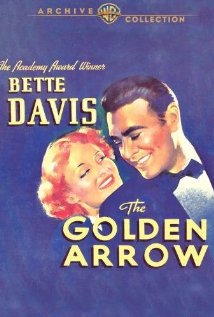
THE GOLDEN ARROW
US, 1936, 68 minutes, Black and white.
Bette Davis, George Brent, Eugene Pallette, Dick Foran, Carol Hughes.
Directed by Alfred E.Green.
The Golden Arrow is the slightest of romantic comedies, a surprise for fans of Bette Davis who had been making films about five years, in a range of roles, both serious and comic. This one is entirely comic, the type of part that could have been taken by any starlet of the period. And her leading man, as in quite a number of films including Dark Victory, is a rather stolid George Brent. Eugene Pallette has a familiar bumbling role; Dick Foran appears only momentarily and Carol Hughes is an ambitious rich girl.
The film focuses on American society, frivolous and wealthy American society, and self-made families who have succeeded with oil and with commercial products.
Bette Davis seems to be the heiress of the Appleby fortune, put out in high society in the US and on the Riviera, isolated with a supervisor and shunning the media. Carol Hughes is an heiress enjoying society with Eugene Pallette as her father.
George Brent is a journalist who is writing a book, gets a chance to interview Bette Davis and they click. Almost impulsively, they get married, the marriage of convenience rather than love – though it is clear that they are going to fall in love. In the meantime, she protests against being the face of Appleby advertising, and it emerges that she is a cashier who was taken on by the company for promotion purposes. They then decide that the journalist should also get a false identity and be a playboy. She seems to be happy on her own. He gets entangled with Carol Hughes.
There are some amusing moments, especially when she gets a black eyed by being hit with a tennis ball and he engineers a black eye and spreads the story that she caused it.
The heiress reveals the truth about Bette Davis, the journalist being excited – and, of course, marrying and happy ever after.
Published in Movie Reviews
Published in
Movie Reviews
Tagged under